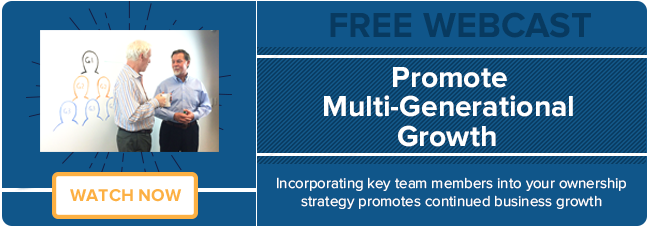Blog
A New Goal for a New Generation


Founding (G1) advisors are asking the wrong question: “How do I hire and retain employees with an entrepreneurial mind-set?” It should be, “How do I attract and retain employees with the skills and expertise to take my business to the next level?”
It’s not that the next generation doesn’t know how to work, it’s that they work and think differently than you do. You shouldn’t look for clones of yourself – you built an entire business from scratch, after all. The new generation of advisors doesn’t need to have fingers in every pie, they don’t need to be excellent in every facet of your business. What you need is a handful of people who all excel in different areas and who combine their expertise to strengthen and grow the business as a team.
To reach these heights, and to build a business that can outlive you, you will need to surround yourself with younger, smarter people. I’m not just speculating here. I have had the privilege of doing just that here at FP Transitions.
Growing One Day At A Time
When we started FP Transitions almost two decades ago, we had a lot of energy and ambition. We were building a national company, we were going to bring a new concept to the table, we were going to take the world by storm. All two of us.
When you have two people and there’s a lot of work to do you do EVERYTHING. I answered the phone, I wrote the white papers, I fixed the copier, I went out and did the speaking engagements; I did anything that needed doing. After a while I began to think that I was really good at all of these things – to be fair, if you spend 12, 14, even 18 hours a day, 6 days a week doing all that, you do get pretty good at it. But I began to believe that no one could market our company, sell our services, balance the books, or answer inquiries better than I could. After all, I was the one developing services and talking about them everyday.
One day, years later, we hired a marketing director, someone who had gone to school for this specific purpose and had experience marketing a business. I watched what she did and I thought, “Oh, THAT’s a marketing plan,” and I realized that marketing probably wasn’t my forte after all. A short time later we hired a sales director, and I listened to him on the phone. I heard how he answered questions and sold our services. I realized that I was not, in fact, the best person to do front line selling.
Little by little we brought in people who could bring something new to the business. And we found that often those with the most unique points of view were of a younger generation. While I may have been skeptical at first, that new way of thinking married with their expertise brought something wonderful to the team. We didn’t need more entrepreneurs – we needed younger people with specific skill sets to help us grow and improve.
As we added new positions and new people to the company, I found myself doing less in a broad sense and more in a focused sense. Now I work on just a few things in the company, but I do them on a deeper level than I’ve ever done them before. And I’m able to dig deep and improve these areas because I don’t have to stay on top of everything else.
I look back and think about how we went from two people to 30. It happened one day at a time, one new professional at a time. Each member of this team has a focus, a place where they excel, and they use their expertise to improve the business as a whole.
This can work for you too. Give your practice the opportunity to become a business, and look for a new generation of thinkers to take it there.
Give a little, get a lot
The team you build doesn’t have to start a business from nothing, they have to build upon the foundation you’ve already put down. Of course, they should be smart, but they don’t need to work 80 hour weeks. Their job is different, and they share the task of growing the business as a team.
Your new talent will quickly show their colors. It will become clear whether they’re willing to invest time and energy into the future of the business if you give them the mindset that they matter in the grand scheme of things. Let them know that they’re an important piece of the puzzle, and they will take it to heart. These are the ones you hold onto, these are the ones you incorporate into your succession plan as G2 owners.
Doubling the size and value of what you have built doesn’t mean doubling the workload and efforts of ownership and staff. That kind of growth will require everyone to think further ahead, to think smarter, and to work more efficiently. As a team, you’re going to have to figure out how to climb to new heights, and ingenuity and creativeness will play bigger roles than long hours and late nights.
As an entrepreneur you did it all. For your succession team, however, it’s going to be different. They’re not entrepreneurs; they’re investors. And they’re putting their careers on the line.
